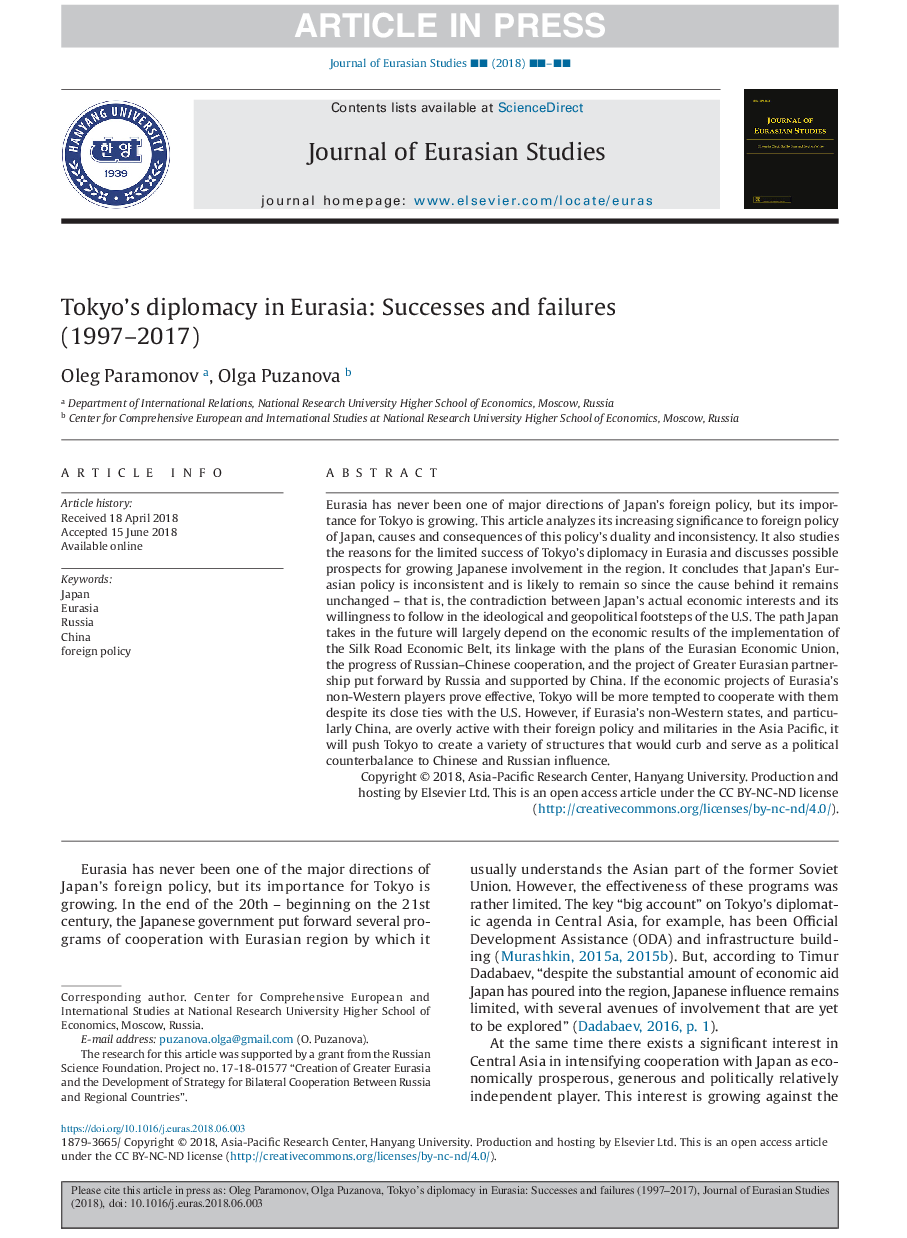| کد مقاله | کد نشریه | سال انتشار | مقاله انگلیسی | نسخه تمام متن |
|---|---|---|---|---|
| 8942567 | 1645098 | 2018 | 9 صفحه PDF | دانلود رایگان |
عنوان انگلیسی مقاله ISI
Tokyo's diplomacy in Eurasia: Successes and failures (1997-2017)
ترجمه فارسی عنوان
دیپلماسی توکیو در اوراسیا: موفقیت و شکست (1997-2017)
دانلود مقاله + سفارش ترجمه
دانلود مقاله ISI انگلیسی
رایگان برای ایرانیان
کلمات کلیدی
ژاپن، اوراسیا، روسیه، چین، سیاست خارجی،
ترجمه چکیده
اوراسیا هرگز یکی از جهت های اصلی سیاست خارجی ژاپن نبوده است، اما اهمیت آن برای توکیو در حال افزایش است. این مقاله اهمیت فزاینده خود را برای سیاست خارجی ژاپن، علل و پیامدهای دوگانگی و ناسازگاری این سیاست را تحلیل می کند. این کشور نیز دلایل موفقیت محدود دیپلماسی توکیو در اوراسیا را مطالعه می کند و در مورد احتمال های احتمالی افزایش درگیری ژاپن در منطقه بحث می کند. این نتیجه گیری می کند که سیاست یوروآسیایی ژاپن ناسازگار است و احتمالا همچنان باقی خواهد ماند زیرا علت آن بدون تغییر باقی می ماند - یعنی تناقض بین منافع واقعی اقتصادی ژاپن و تمایل آنها به پیروی در راه های ایدئولوژیک و ژئوپلتیک ایالات متحده مسیر ژاپن در آینده تا حد زیادی به نتایج اقتصادی اجرای کمربند اقتصادی جاده ابریشم، ارتباط آن با برنامه های اتحادیه اقتصادی اوراسیا، پیشرفت همکاری روسیه و چین و پروژه همکاری بزرگ اوراسیایی که توسط روسیه ارائه شده است، بستگی دارد. و توسط چین پشتیبانی می شود. اگر پروژه های اقتصادی بازیکنان غیر غربی اوراسیا اثبات مؤثر شود، توکیو بیشتر با وسوسه همکاری با آنها روبرو خواهد بود، با وجود ارتباط نزدیک آن با ایالات متحده. با این حال اگر کشورهای غربی غربی اوراسیا و بویژه چین با سیاست خارجی خود همکاری داشته باشند ارتش در آسیا و اقیانوس آرام، توکیو را برای ایجاد ساختارهای متنوعی آماده می کند که می تواند مانع و مقابله با نفوذ چین و روسیه شود.
موضوعات مرتبط
علوم انسانی و اجتماعی
علوم انسانی و هنر
هنر و علوم انسانی (عمومی)
چکیده انگلیسی
Eurasia has never been one of major directions of Japan's foreign policy, but its importance for Tokyo is growing. This article analyzes its increasing significance to foreign policy of Japan, causes and consequences of this policy's duality and inconsistency. It also studies the reasons for the limited success of Tokyo's diplomacy in Eurasia and discusses possible prospects for growing Japanese involvement in the region. It concludes that Japan's Eurasian policy is inconsistent and is likely to remain so since the cause behind it remains unchanged - that is, the contradiction between Japan's actual economic interests and its willingness to follow in the ideological and geopolitical footsteps of the U.S. The path Japan takes in the future will largely depend on the economic results of the implementation of the Silk Road Economic Belt, its linkage with the plans of the Eurasian Economic Union, the progress of Russian-Chinese cooperation, and the project of Greater Eurasian partnership put forward by Russia and supported by China. If the economic projects of Eurasia's non-Western players prove effective, Tokyo will be more tempted to cooperate with them despite its close ties with the U.S. However, if Eurasia's non-Western states, and particularly China, are overly active with their foreign policy and militaries in the Asia Pacific, it will push Tokyo to create a variety of structures that would curb and serve as a political counterbalance to Chinese and Russian influence.
ناشر
Database: Elsevier - ScienceDirect (ساینس دایرکت)
Journal: Journal of Eurasian Studies - Volume 9, Issue 2, July 2018, Pages 134-142
Journal: Journal of Eurasian Studies - Volume 9, Issue 2, July 2018, Pages 134-142
نویسندگان
Oleg Paramonov, Olga Puzanova,
